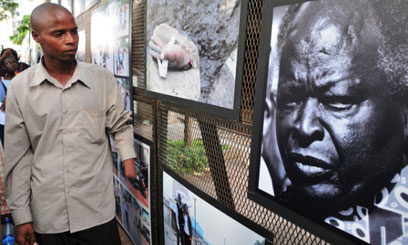
The passion for photography was sparked by photographer Mohamed Amin’s work on the Ethiopian famine in 1984 and its impact worldwide. But it was Mwangi’s photos of Kenya’s post-election violence that pushed him into a spotlight of his own/RNW
At his home in a western suburb of Nairobi, Mwangi is sitting on the couch. He looks tired. His three little kids run around while his wife makes tea in the kitchen. He himself comes from a “broken home”, as he describes it, having grown up in a slum with six siblings from six different fathers. He says his Christian beliefs saved him from getting into crime. The passion for photography was sparked by photographer Mohamed Amin’s work on the Ethiopian famine in 1984 and its impact worldwide. But it was Mwangi’s photos of Kenya’s post-election violence that pushed him into a spotlight of his own.
Can you say where this desire to create social change came from?
I became traumatized after the post-election violence because of what happened and because my work was not published as much in Kenya. It was just published outside the country. I became bitter and frustrated. And after the violence ended, we forgot about the victims. But for me, the victims were alive, because I could see the pictures and had flashbacks of what I had seen. I decided to quit my job as a photographer for a newspaper and to do something about it.
You decided to use your work to make people reflect on what happened. You founded Picha Mtaani and travelled around the country with the photos you took of the post-election violence. How do you think an art exhibition can elicit change in people?
The purpose of the Picha Mtaani exhibitions was healing the nation. We had hundreds of thousands of people coming to the exhibitions. Through looking at the pictures, they were able to open up and talk. We had the exhibition, we had tents where guys could have conversations and we had counselling for victims and perpetrators. We made people sign a peace pledge, committing themselves to non-violence. So it was very important for the country. And it helped me dealing with my own traumas.
A few years later you started Pawa254. The non-profit organization was behind graffiti that has been showing up in Nairobi lately, portraying politicians as vultures and asking for fair elections. Last month it organized the Love Protest. What is the latest campaign?
We just started The Ballot Revolution. Through a T-shirt campaign, we want people to understand the power of the vote. If you don’t like somebody, you don’t have to hurt him, you just vote him out. If you vote for the right person, you vote for a good future. The difficulty is of course that there are no good candidates, so we are now talking with good people to make them run for office. But the problem with our politics is money. People who have solutions for this country have no money to campaign. Guys with lots of money bribe you, but they have no solutions. [Kenya’s] politics is just dirty.
How can you engage people to make a change?
The people themselves can change the system, people have to realize that they have power with their vote. And you need to give them a selfish reason, only then they are willing to change things. For me, I am doing this for the future of my kids.
After all the work you have done, trying to heal the nation through your campaigns, how would you feel if violence resumed after next year’s election?
I have been giving that some thought. I’m afraid of being heartbroken again. What worries me is that we have so many victims who haven’t found justice yet. There is no justice out here, so people are bound to revenge. They have a lot of bitterness built up; it’s like a time bomb. If not addressed, it’s a serious danger for this country.
What is your dream for the future of Kenya?
I want Kenya to be safe. I wish [that] nobody fears getting raped or mugged. The insecurity in this country shows that our systems don’t work. And as long as people are hungry, poor and treated unjustly, criminality won’t stop.
This article was first published on Radio Netherlands Worldwide (http://www.rnw.nl)








































